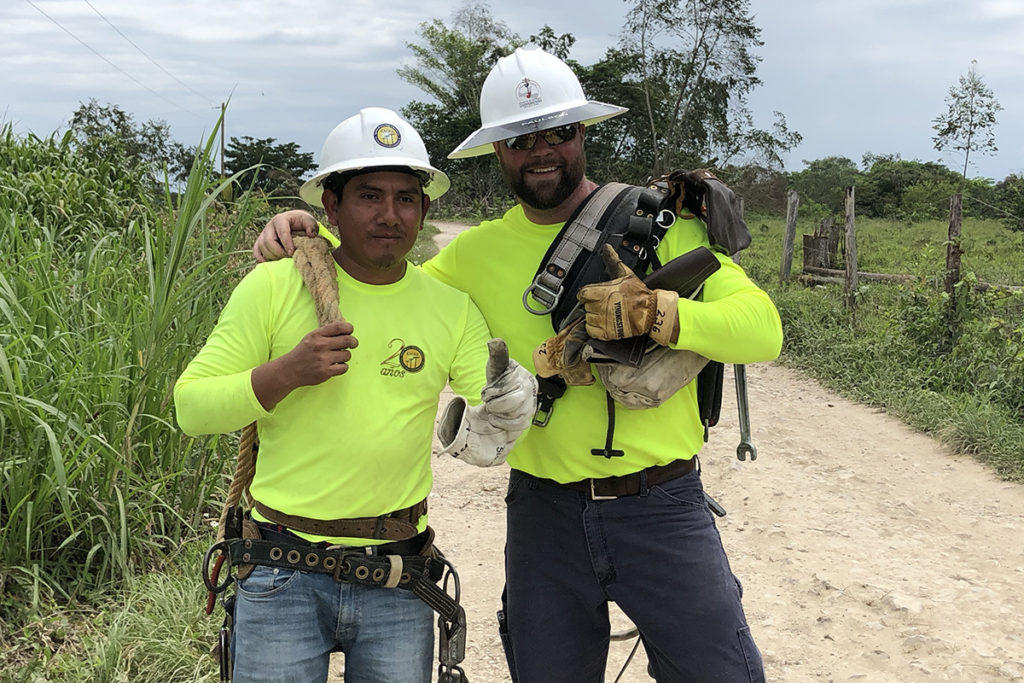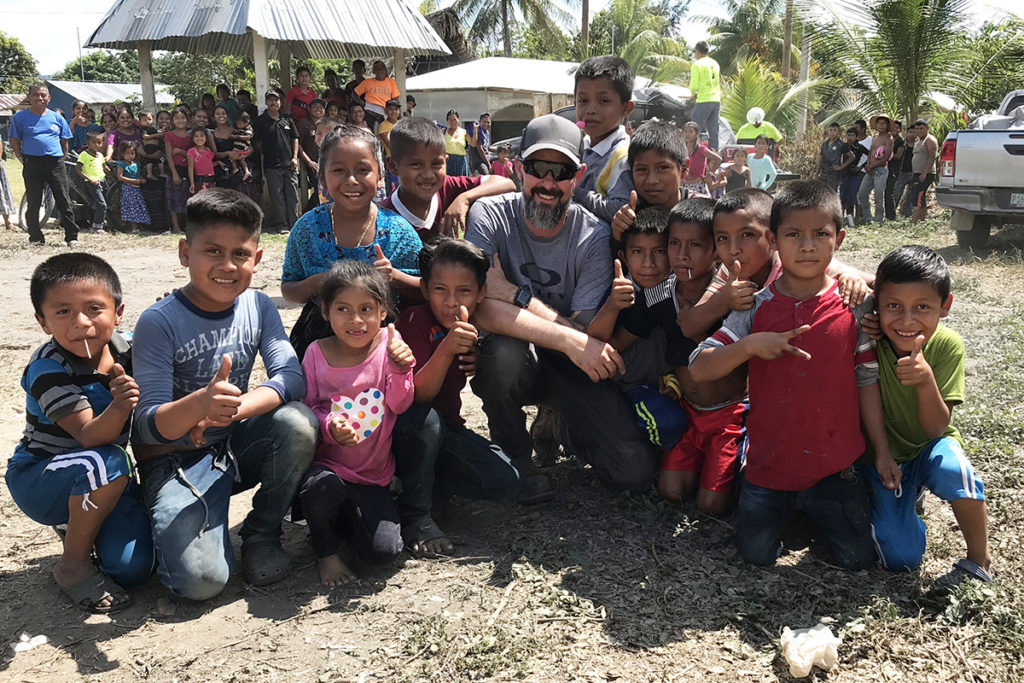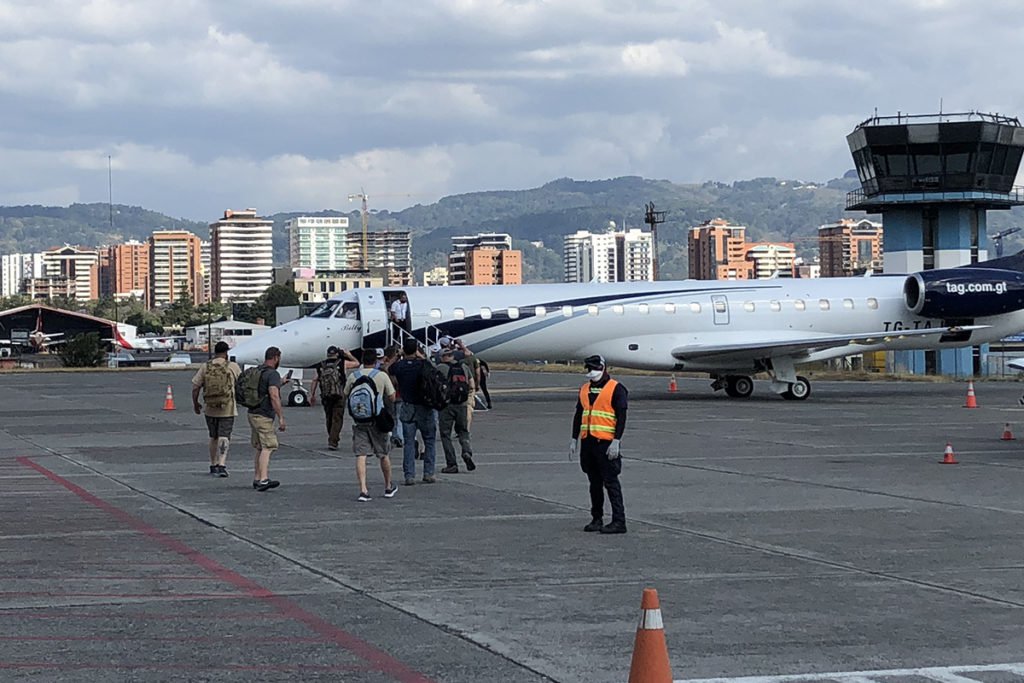
Sixteen lineworkers from electric cooperatives in Ohio flew to Guatemala on March 9 to bring electricity to homes, schools and churches in two remote villages. A week later, they were nearly stranded in Guatemala City as the government abruptly closed its borders and canceled all flights because of the coronavirus pandemic.
An all-out effort by leaders of Ohio’s Electric Cooperatives, NRECA International and members of Congress brought the volunteers home to their families on March 19. As grateful as they are to be back in Ohio, the lineworkers said they’re even more excited that they were able to bring power to 73 homes and two schools in the Guatemalan villages before their trip was cut short.
The volunteers completed their mission in about five and a half days, roughly a week faster than they had been scheduled to finish. As they rushed to the airport, the crew worried that they hadn’t had a chance to test the system before they had to leave.
“That was weighing heavy on my mind,” said Jason McDermott, a field engineer for OEC. “I was concerned that I may have left those folks with a hot mess to deal with. But the day after we left, EMRE, the local co-op, sent us texts saying that they were able to power up. Everything was golden. Nothing else mattered after that for me.”

As the Ohio crew focused on the Tierra Blanca Sebol project in north-central Guatemala, their co-ops were dealing with news of the rapidly escalating spread of COVID-19 and the increasingly stringent government restrictions in both Central America and the United States.
“They left for Guatemala on a Monday and, within just a few days, the coronavirus situation went from zero to 120,” said Doug Miller, vice president of OEC. “The Guatemalan government announced that they were going to close the border and the airport by midnight the next Monday, and we knew that we had to get those guys back as soon as possible.”
After checking the wiring in the villages one last time on the morning of March 16, the lineworkers raced eight hours toward Guatemala City, trying to beat the clock as the midnight border closure loomed. They made it by about 11 p.m., but commercial airlines had already canceled all flights. The crew checked into a Holiday Inn for the night, not knowing when they might get out.
“We had no idea what would happen,” said Kyle Hoffman, who led the Ohio team and is the lead instructor and coordinator at OEC’s training facility. “But we knew we had a lot of people back home working on our behalf.”
Ingrid Hunsicker, senior program manager for NRECA International, arranged a charter plane to pick up the lineworkers while OEC and NRECA leaders coordinated with members of the Ohio congressional delegation and nearly a half dozen agencies in the Trump administration for help in getting the Guatemalan government to allow the volunteers to leave and the Miami airport to let them land.
Rep. Bill Johnson, R-Ohio, said he contacted Guatemala’s ambassador to the U.S. when he heard that the lineworkers needed help. Johnson met Ambassador Manuel Espina at the National Prayer Breakfast in Washington several years ago and had remained in touch with him.
“I called Manuel and he put me in touch with top officials, who pledged to do everything they could to help us,” the congressman said. “I kept in touch with Kyle Hoffman to make sure they didn’t leave the airport in Guatemala City while we were trying to get the permits. They went down there on a noble cause, and I’m glad we were able to get them home.”
Sean Luellen, a crew leader at Union Rural Electric Cooperative in Marysville, Ohio, said “everybody was on pins and needles” after waiting for two days in Guatemala City until the charter plane took off for Miami. When they landed, the men waited another two and a half hours on the plane for U.S. Customs officials to get ready to process them.

“There wasn’t a soul when we went into the Miami airport,” Luellen said. “We took a shuttle to the hotel and ordered eight large pizzas and sat outside, breathing a sigh of relief.”
The next morning, the volunteers boarded a commercial flight for Columbus, Ohio, where OEC leaders greeted them at the airport and took them on buses to co-op headquarters to reunite with their families.
“It was very heartwarming,” said Luellen, who, like the other volunteers, is back on the job in Ohio. “Despite everything, I’m very glad I went to Guatemala and I’d do it again tomorrow. To go down there and see the hope in people’s eyes is priceless.”
Hoffman said a baby was born in one of the villages just before they left.
“That baby will never know a life without electricity,” said Hoffman, a father of four. “What a gift to give a person. That is why when they ask me to sign up again, I’ll be the first on the list.”
Erin Kelly is a staff writer at NRECA.
Read more on the electric co-op response to the COVID-19 Pandemic
See NRECA’s COVID-19 hub on cooperative.com for key resources for co-ops, including guidance on business continuity planning and communication, as well as event schedule changes.